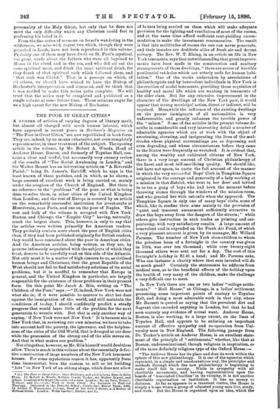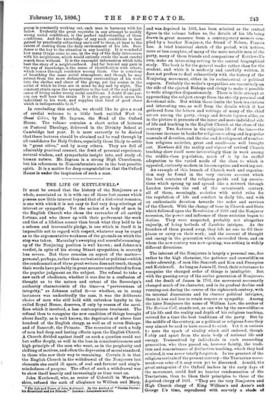THE POOR IN GREAT CITIES.*
A NUMBER of articles of varying degrees of literary merit, but almost all charged with much human interest, which have appeared in recent years in Scribner's Magazine on " The Poor in Great Cities," are now republished in book form. They are, indeed, by no means exhaustive, nor even completely representative, in their treatment of the subject. The opening article in the volume, by Mr. Robert A. Woods, Head of Andover House, Boston, and formerly of Toynbee Hall, con- tains a clear and useful, but necessarily very cursory review of the results of "The Social Awakening in London," and Sir Walter Besant has an interesting article on "A Riverside Parish," being St. James's, Rateliff, which he says is the least known of those parishes, and in which, as he shows, a large amount of excellent work is being carried on, mainly under the auspices of the Church of England. But there is no reference to the " problems " of the poor, or what is being done to solve them, in other cities of the United Kingdom than London; and the rest of Europe is covered by an article on the remarkably successful institution for street-arabs at lfonte'vrain, near Paris, and one on the poor of Naples. The rest and bulk of the volume is occupied with New York, Boston, and Chicago, the "Empire City" having, naturally, much the largest share. This, however, is only to say that the articles were written primarily for American readers. They probably ccntaiu more about the poor of English cities than, if they had been published originally for British readers, they would have contained about the poor in American cities. And the American articles, being written, as they are, by persons intimately acquainted with the subjects of which they treat, deserve to be carefully read on this side of the Atlantic. Not only must it be a matter of high concern to us, as civilised human beings and Christians, that the great Republic of the West should not fail to find satisfactory solutions of its social problems, but it is needful to remember that Europe in general, and the United Kingdom in particular, are largely responsible for the existence of those problems in their present form. On this point Mr. Jacob A. Riis, writing on " The Children of the Poor," says :—" If, indeed, New York were not what she is ; if it were possible to-morrow to shut her door against the immigration of the world, and still maintain the conditions of to-day, I should confidently predict a steady progress that would leave little of the problem for the next generation to wrestle with. But that is only another way of saying. ` if New York were not New York. It is because she is Now York that, in reviewing our own miseries, we have to take into account half the poverty, the ignorance, and the helpless- ness of the cities of the Old World, that is dumped at our door while the procession of the strong and of the able moves on. And that is what makes our problem."
Not altogether, however, as Mr. Riis himself would doubtless allow. There is much in this volume about the essentially defec- tive construction of large numbers of the New York tenement houses. For some mysterious reason it has, apparently from time immemorial, been the custom to sell or let building "Jots " in New York of an oblong shape, which does not allow
• (1.) The Poor in Great Cities: thew Problem., and what is being Dons to Soles Thom. Py Robert A. Wadi!, William Jewett Tucker, Sr Walter Breant, and others. lanstrat* d by Hugh nommen 4nd where. London : E.e:an Paul, Trench, Tillbeer. and Co.—(2., Work in Grew. Caws x Lectures on Past mai Theology. Delivered to the Divinity Schon'„ Cambridge, Roster .Term, 1995, by Arthur F. Winuineton Inerrant, Head of the Osfo d House, aLd Rector of Bethnal Green. London: Wells Gardne-, Barton, and 0.1.
of hcnses being erected on them which will make adequate provision for the lighting and ventilation of most of the rooms, and at the same time afford sufficient rent-yielding accom- modation to make the investment remunerative. The result is that into multitudes of rooms the sun can never penetrate, and their inmates are destitute alike of fresh air and decent privacy. The Rev. W. T. Elsing, in an article on life in New York tenements, says that notwithstanding that great improve- ments have been made in the construction and sanitary arrangements of those dwellings, " there are scores of horrible pestilential rat-holes which are utterly unfit for human habi- tation." One of the works undertaken by associations of philantbropiata and by benevolent individuals in New York is the erection of model tenements, providing those requisites of healthy and moral life which are wanting in tenements of the older class. But for any extensive improvement in the character of the dwellings of the New York poor, it would appear that strong municipal action, direct or indirect, will be required. Meanwhile the influence of the existing dwellings on the poorer immigrants of all nationalities is very unfavourable, and greatly enhances the terrible power of the " saloon." Some of the articles in the present volume de- scribe in considerable and very interesting detail a number of admirable agencies which are at work with the object of sweetening, elevating, and invigorating the lives of the mul- titudes whose physical surroundings are so depressing and even degrading, and whose circumstances before they came to the States were frequently so wretched. It is evident that, among the wealthy and cultivated citizens of New York, there is a very large amount of Christian philanthropy of the finest and most self-sacrificing quality. We should like, but have not space, to quote the full account of the manner in which the very successful Boys' Club in Tompkins Square originated in the courage and generosity of a lady working at a mission in that district, who went to her door and invited in to tea a gang of boys who had been the moment before throwing stones through the windows of the mission-room, and who greeted her with cat-calls when she appeared. The Tompkins Square is only one of many boys' clubs, some of which, like it, confine their aims mainly to the provision of "quiet and innocent amusement sufficiently attractive to draw the boys away from the dangers of the streets; " while others give instruction in such trades as priating and car- pentering, with very satisfactory results. A large amount of benevolent zeal is expended on the Fresh Air Fand, of which a very pleasant account is given by its manager, Mr. Willard Parsons. The number of New York slum-children to whom the priceless boon of a fortnight in the country was given in 1894, was over ten thousand; while over twenty-eight thousand others were sent out for a day. The cost of this fortnight's holiday is $2.46 a head; and Mr. Parsons asks, Who can instance a charity where that sum invested will do as much good ? Certainly the statements he adduces from medical men, as to the beneficial effects of the holiday upon the health of very many of the children, make the challenge a very difficult one to meet.
In New York there are one or two ladies' "college settle- ments." " Hull House," at Chicago, is a ladies' settlement presenting some important points of analogy to Toynbee Hall, and doing a most admirable work in that city, where Mr. Barnett is quoted as saying that the prevalent dirt and flagrant vice exceeded anything in London, but that he had seen scarcely any evidence of actual want. Andover House, Boston, is also working, to a large extent, on the lines of Toynbee Hall, and appears to be enlisting an important amount of effective sympathy and co-operation from Uni- versity men in New England. The following passage from Dr. Tucker's article on Andover House, is an excellent state- ment of the principle of " settlements," whether, like that at Boston, undenominational, though religions in inspiration, or of the more definitely religious type of the Oxford Honse:—
"The Andover House has its place and does its work within the sphere of this new philanthropy. It is one of the agencies which represent, in a simple and unostentatious way, the principles and methods through which the new philanthropy is beginning to make itself felt in society. While in sympathy with all charitable movements, and having representatives upon the boards of ' Associated Charities' in its vicinity, it is not another charitable organisation or institution. It has no money to disburse. As far as appears to a transient visitor, the House is simply a home where a group of educated young men live, study, and work. But the House is organised upon an idea, which the
group is constantly working out, each man in harmony with his fellow. Evidently the great requisite in any attempt to modify wrong social conditions, is the perfect understanding of those conditions. And the knowledge of any such conditions is best gained by practically subjecting one's self to them, at least to the extent of making them the daily environment of his life. Resi- dence is the key to the situation in any locality. It is wonderful how many things come to one, in the way of the daily intercourse with his neighbours, which would entirely evade the most careful search from without. It is the unsought information which tells best the story of a neighbourhood. And far beyond any gain in the way of knowledge, is the sense of identification with others, which comes through residence among them. One is conscious of breathing the same social atmosphere, and though he may retreat from the more disheartening surroundings of his work into the shelter and cheer of the group, yet the scenes in the midst of which he lives are in mind by day and by night. The constant strain upon the sympathies is the test of the real signifi- cance of living under wrong social conditions. I doubt if one per- son can well bear the strain It is the group which saves the individual to his work, and supplies that fund of good cheer which is indispensable to it."
In concluding this article, we should like to give a word of cordial welcome to a little book entitled Work in Great Cities, by Mr. Ingram, the Head of the Oxford House. The volume contains a short series of lectures on Pastoral Theology, delivered in the Divinity School at Cambridge last year. It is most earnestly to be desired that these lectures should be obtained and be read through by all candidates for Holy Orders, especially those likely to settle in "great cities," and by many others. They are full of admirably practical counsel, the fruit of personal experience, natural wisdom, and sympathetic insight into, and study of, human nature. Mr. Ingram is a strong High Churchman, but his references to Nonconformists are in the best possible spirit. It is a matter for deep congratulation that the Oxford Haase is ander the inspiration of such a man.



































 Previous page
Previous page